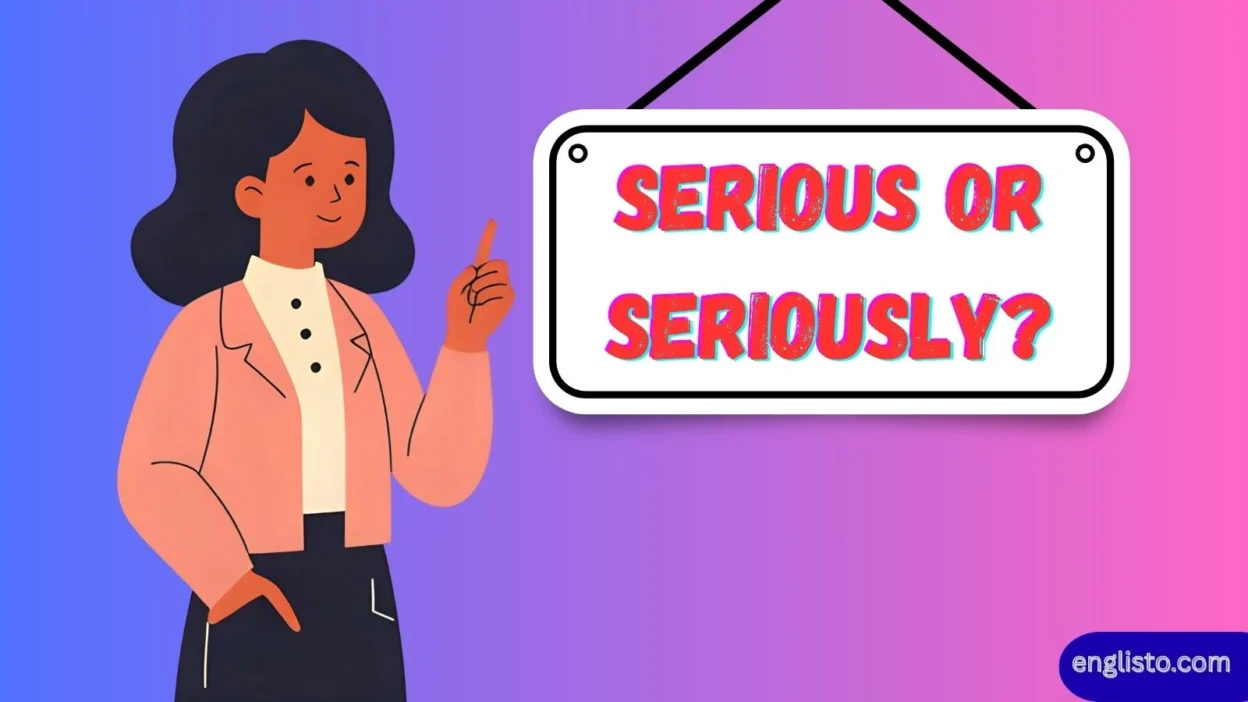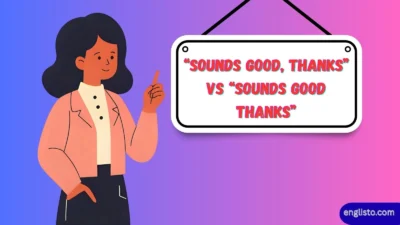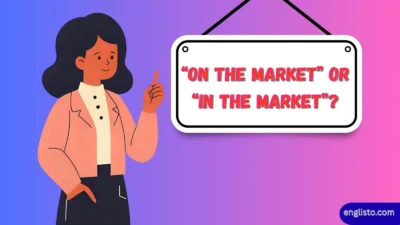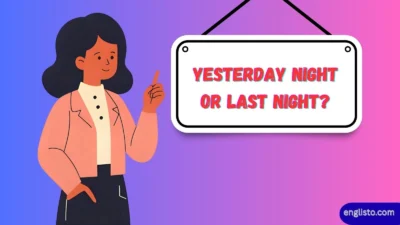Language can be tricky, especially when two words look and sound similar but play different roles in sentences. Serious or Seriously? are perfect examples. Both come from the same root, but one is an adjective and the other is an adverb. This difference changes not only how they’re used but also what they mean in context. Misusing them can make your English sound unnatural or even confusing.
This article explores the grammar, meanings, idioms, real-life examples, synonyms, and cultural context behind serious and seriously. You’ll learn how to spot the difference instantly, when to use each word, and why native speakers sometimes bend the rules.
The Core Difference Between “Serious” and “Seriously”
At its simplest:
| Word | Part of Speech | Function in a Sentence | Example Sentence |
| Serious | Adjective | Describes a noun (person, thing, situation) | He has a serious problem. |
| Seriously | Adverb | Modifies a verb, adjective, or phrase | She spoke seriously about the accident. |
Think of serious as a word that qualifies or describes a state. Meanwhile, seriously tells you how something is done or in what manner it’s expressed.
Using “Serious” in Everyday English
“Serious” is used to describe a person, situation, or thing that is important, grave, or not joking. It acts as an adjective and often carries weight or intensity.
Common Uses of “Serious”
- Describing Problems or Situations
- The patient is in serious condition.
- Global warming is a serious issue.
- The patient is in serious condition.
- Describing People
- She’s a serious student who studies every night.
- He has a serious expression on his face.
- She’s a serious student who studies every night.
- Talking About Intentions
- Are you serious about moving to another country?
- They’re in a serious relationship.
- Are you serious about moving to another country?
Synonyms for “Serious”
| Context | Synonyms | Example |
| Grave/Important | grave, weighty, critical | That’s a grave mistake. |
| Focused | earnest, intent, dedicated | He’s an earnest learner. |
| Not joking | genuine, sincere | Are you sincere or joking? |
Using “Seriously” in Everyday English
“Seriously” modifies verbs, adjectives, or whole statements. It often explains the manner in which something is done or emphasizes disbelief.
Common Uses of “Seriously”
- Manner of Action
- He spoke seriously about the consequences.
- She takes her studies seriously.
- He spoke seriously about the consequences.
- Exclamations or Interjections
- “Seriously?! You forgot your passport?”
- “Seriously, that was the best dessert ever.”
- “Seriously?! You forgot your passport?”
- Emphasis in Informal Speech
- That movie was seriously good.
- You need to think seriously before quitting your job.
- That movie was seriously good.
Synonyms for “Seriously”
| Context | Synonyms | Example |
| In earnest | sincerely, genuinely | He apologized sincerely. |
| Emphasis | really, truly, honestly | That’s really impressive. |
| With gravity | gravely, severely | The child was gravely injured. |
Grammar Clues: Spotting the Ending “-ly”
A simple grammar hack:
- Adjectives often end without “-ly.” (serious, happy, angry)
- Adverbs often end in “-ly.” (seriously, happily, angrily)
But beware of exceptions like fast (both adjective and adverb) or hard vs. hardly. Still, the “-ly” ending is a reliable clue in most cases.
Idiomatic Expressions with “Serious” and “Seriously”
Idioms and informal phrases make these words even more interesting.
- In all seriousness – I was joking earlier, but in all seriousness, you should see a doctor.
- Dead serious – I’m dead serious about this plan.
- Take something seriously – You should take these warnings seriously.
- Seriously though – Seriously though, are you coming to the meeting?
- Are you serious? – A common reaction expressing disbelief.
These idioms are often used in spoken English and may not always align with formal grammar rules, but they add flavor to conversations.
Common Mistakes Learners Make
It’s easy to confuse “serious” and “seriously,” especially for non-native speakers.
| Mistake | Incorrect Example | Correct Example | Why It’s Wrong |
| Using “serious” instead of “seriously” | He spoke serious about the problem. | He spoke seriously about the problem. | Adverb needed to modify the verb “spoke.” |
| Using “seriously” instead of “serious” | She has a seriously injury. | She has a serious injury. | Adjective needed to describe the noun “injury.” |
| Mixing tone in speech | Are you seriously? | Are you serious? | The question requires an adjective, not an adverb. |
Real-Life Usage: How People Actually Talk
In casual English, “seriously” often replaces “really” or “very.” You might hear:
- That’s seriously funny.
- I’m seriously tired.
This informal use emphasizes intensity, even if it’s grammatically more relaxed. By contrast, “serious” tends to stay in formal or descriptive roles.
Native speakers also use “Seriously?” alone as a quick reaction, similar to “Are you kidding me?”
Historical and Linguistic Background
- Origin of “Serious”: Middle French serieux and Latin sērius, meaning “grave” or “earnest.”
- Origin of “Seriously”: Extension with the adverbial suffix “-ly” in Middle English.
Interestingly, both words appear frequently in literary English. Writers often use “seriously” to add tone to dialogue, while “serious” anchors narrative descriptions.
A quick check on Google Ngram Viewer shows that “serious” appears more often than “seriously,” largely because adjectives are more common in descriptive writing.
Practical Tips for Learners
- Check the role: Are you describing a noun? → Use serious. Are you describing an action or attitude? → Use seriously.
- Look for endings: “-ly” usually signals an adverb.
- Think about tone: Want to sound formal? Stick with textbook grammar. Want to sound natural in conversation? Idioms with “seriously” are fine.
- Avoid confusion: Don’t mix the two unless you’re mimicking native speaker humor.
Quick Reference Table
| Situation | Correct Word | Example |
| Noun description | serious | This is a serious matter. |
| Verb modification | seriously | He spoke seriously about it. |
| Idiomatic disbelief | seriously | “Seriously?! That’s unbelievable.” |
| Emotional state | serious | She looked serious after hearing the news. |
| Informal intensity | seriously | That pizza was seriously good. |
FAQs
What does “serious” mean in grammar?
It’s an adjective used to describe a noun (person, thing, or situation).
What does “seriously” mean in grammar?
It’s an adverb that modifies a verb, adjective, or phrase, often adding tone or emphasis.
Can “seriously” mean “really”?
Yes. In informal English, “seriously” often means really or truly.
Is “Are you serious?” the same as “Seriously?”
Not quite. “Are you serious?” is a full question. “Seriously?” is a reaction, often used alone.
Why do people misuse “serious” and “seriously”?
Because they look alike, share roots, and sometimes overlap in idioms. Native speakers break the rules in casual speech, which adds to the confusion.
Conclusion
The difference between serious and seriously may seem small, but it changes how a sentence is understood. Serious describes nouns—people, problems, or conditions. Seriously modifies verbs, adjectives, or statements, adding gravity, sincerity, or emphasis.
To master them, remember:
- Serious = describing something.
- Seriously = describing how something is done.
Whether you’re preparing for an IELTS exam, writing an essay, or just chatting with friends, knowing when to use each word helps you sound clear, natural, and confident.
Because in all seriousness—language matters. And seriously, it can make all the difference.



